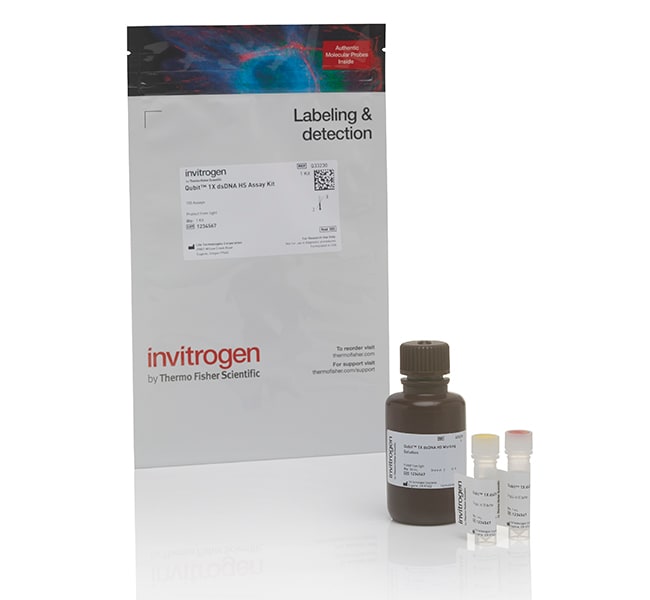Search Thermo Fisher Scientific

Qubit™ 1X dsDNA High Sensitivity (HS) and Broad Range (BR) Assay Kits
| Catalog Number | Quantity | Assay | Quantitation Range |
|---|---|---|---|
| Q33230 | 100 assays | 1X dsDNA, high sensitivity | 0.1 to 120 ng |
| Q33231 | 500 assays | 1X dsDNA, high sensitivity | 0.1 to 120 ng |
| Q33266 | 500 assays | 1X dsDNA, broad range | 4 to 4000 ng |
| Q33265 | 100 assays | 1X dsDNA, broad range | 4 to 4000 ng |
Qubit 1X dsDNA HS Assay Kit
The Qubit dsDNA HS (High Sensitivity) Assay Kit, when used with the Qubit Fluorometer, provides an accurate and selective method for the quantitation of sensitive DNA samples. Depending on sample volume, the assay kit is designed to be accurate for initial DNA sample concentrations of 5 pg/μL to 120 ng/μL, providing a detection range of 0.1−120 ng.
Qubit 1X dsDNA BR Assay Kit
The Qubit dsDNA BR (Broad-Range) Assay Kit, designed for use with Qubit 4 or Qubit Flex Fluorometers, provides an accurate and selective method for the quantitation of DNA samples. Depending on sample volume, the assay kit is designed to be accurate for initial DNA sample concentrations of 0.2 to 4,000 ng/μL, providing a detection range of 4-4,000 ng.
Notes
• Qubit 1X dsDNA HS can be used with Qubit 2, Qubit 3, Qubit 4, and Qubit Flex Fluorometers
• Qubit 1X dsDNA BR are designed for use with Qubit 4 and Qubit Flex Fluorometers
• Use thin-wall, clear, 0.5-mL PCR tubes (Cat. No. Q32856) for the Qubit 4 Fluorometer and 8 x 200 μL tube strips (Cat. No. Q33252) for the Qubit Flex Fluorometer
Enhance your Qubit Fluorometer with the latest firmware
New Qubit 4 and Qubit Flex firmware features include importing sample IDs, renaming files before exporting, a countdown timer, and on-board troubleshooting guidance. Get the most out of your Qubit assays with these powerful new tools.
Customers who viewed this item also viewed
Documents & Downloads
Certificates
Safety Data Sheets
Scientific Resources
Product Information
Frequently asked questions (FAQs)
The Qubit 1X dsDNA High Sensitivity (HS) and Broad Range (BR) Assay Kits (Cat. Nos. Cat. Q33230, Q33231, Q33265, Q33266) are stable for 6 months from the date of receipt when stored as directed.
For more information on product storage, please refer to the user guides:
Qubit 1X dsDNA HS Assay Kit and Qubit 1X dsDNA BR Assay Kit
Find additional tips, troubleshooting help, and resources within our Nucleic Acid Quantification Support Center.
The Qubit 1X dsDNA High Sensitivity (HS) and Broad Range (BR) Assay Kits (Cat. Nos. Q33230, Q33231, Q33265, Q33366) are newer and have a simplified workflow compared to the original Qubit dsDNA Quantification Assay Kits (Cat. Nos. Q32850, Q32851, Q32853, Q32854). The original Qubit kits contain separate dyes and buffer components that must be mixed together to make a working solution, in which the dye degrades after a few hours. With the newer Qubit 1X dsDNA Assay kits, the dye is premixed with a buffer that keeps the dye stable long-term and can be added directly to DNA samples.
You can find more information about the Qubit 1X dsDNA assay, by clicking on the Technical Note provided below:
Qubit 1X dsDNA assays: simplified workflow and improved performance
Find additional tips, troubleshooting help, and resources within our Nucleic Acid Quantification Support Center.
The Qubit 1X dsDNA High Sensitivity (HS) (Cat. Nos. Q33230, Q33231) and Broad Range (BR) Assay Kits (Cat. Nos. Q33265, Q33266) have different storage conditions.
For Qubit 1X dsDNA HS Assay Kits (Cat. Nos. Q33230, Q33231), store all components at 2 - 8 degrees C.
For Qubit 1X dsDNA BR Assay Kits (Cat. Nos. Q33265, Q33266), store the working solution at 18 - 28 degrees C. Store the standards at 2 - 8 degrees C.
The assay kits are stable for at least 6 months from the date of receipt.
For more information, please refer to these user guides:
Qubit 1X dsDNA HS Assay Kit and Qubit 1X dsDNA BR Assay Kit
Find additional tips, troubleshooting help, and resources within our Nucleic Acid Quantification Support Center.
